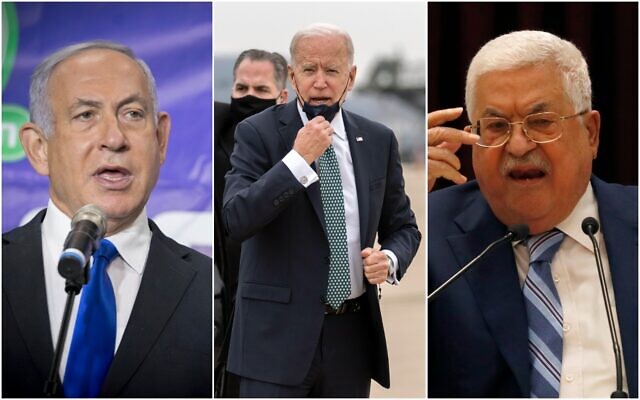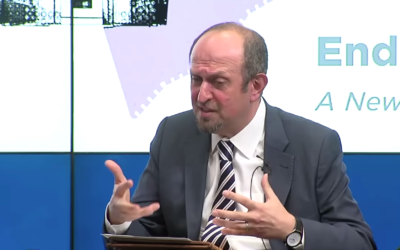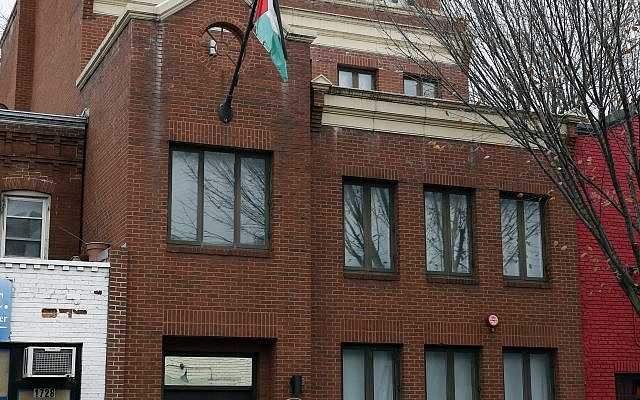T. Belman. If this isn’t regressive, what is? Obama couldn’t sell it even with the support of the Gulf States. Biden for sure can’t sell it because of the stability of the Abrahamic Accords and his embrace of Iran.
If Netanyahu forms the next government, Bennett will for sure be his Defense Minister with full authority over J&S. He is sure to insist on immediate extension of Israel law to the 30% promised by Trump, at a minimum.
Plans for ‘reset’ of PA ties include rollback of Trump policies legitimizing settlements, $15 million in COVID-related aid to Palestinians
By JACOB MAGID, TOI 17 March 2021,

(L-R) Prime Minister Benjamin Netanyahu, US President Joe Biden and Palestinian Authority President Mahmoud Abbas. (Collage/AP)
The Biden administration will reportedly push for a two-state solution based on the pre-1967 lines, with mutually agreed upon land swaps, reinstating US policy on the Israeli-Palestinian conflict to more traditionally held positions than those of former president Donald Trump.
A memo titled “The US Palestinian Reset and the Path Forward,” which was revealed Wednesday to the Abu Dhabi-based The National, also showed that the Biden administration is planning on announcing a $15 million aid package in coronavirus-related humanitarian assistance for the Palestinians as early as this month.
Drafted by Deputy Assistant Secretary for Israeli and Palestinian Affairs Hady Amr, the memo also details plans to roll back various Trump policies that Washington believes made reaching a two-state solution more difficult, such as US legitimization of the settlement enterprise.
>
Amr recommends in the memo that the White House back a two-state framework “based on the 1967 lines with mutually agreed land swaps and agreements on security and refugees.”

Hady Amr, now US Deputy Assistant Secretary of State for Israeli and Palestinian Affairs, speaks at the Brookings Institute, where he was a fellow, on December 3, 2018. (Screen capture/YouTube)
While behind closed doors, Prime Minister Benjamin Netanyahu has participated in peace negotiations based on the 1967 lines, publicly the formula is not very popular in Israel, particularly among the right wing, which is expected to further expand in the Knesset after next week’s election.
The memo discusses “rolling back certain steps by the prior administration that bring into question our commitment or pose real barriers to a two-state solution, such as country of origin labeling.”
The memo was referring to a last-minute policy change announced by Trump’s secretary of state Mike Pompeo, which requires all US exports from the settlements to be labeled as having been “made in Israel.”
Since 1995, US policy had required products made in the West Bank and Gaza to be labeled as such. That directive was republished in 2016 by the Obama administration, which warned that labeling goods as “made in Israel” could lead to fines. Prior to the Oslo Accords, however, all products manufactured in these areas were required to mention Israel in their label when exporting to the United States.
The Pompeo order went into effect in December, but manufacturers were given a 90-day grace period, until March 23, to implement the change.
“As we reset US relations with the Palestinians, the Palestinian body politic is at an inflection point as it moves towards its first elections in 15 years,” the new memo reads. “At the same time, we [the US] suffer from a lack of connective tissue following the 2018 closure of the PLO office in Washington and refusal of Palestinian Authority leadership to directly engage with our embassy to Israel.”
The Washington office of the Palestine Liberation Organization, pictured in 2017. (AP Photo/Alex Brandon)
Trump closed the Palestinian Liberation Organization’s diplomatic mission in Washington in 2018, against the backdrop of the PA’s boycott of his administration following the US recognition of Jerusalem as Israel’s capital.
In 2019, the Trump administration shuttered the US consulate in Jerusalem, which served as the de facto embassy to the Palestinians in East Jerusalem, the West Bank and Gaza. The mission was folded into the US embassy to Israel in Jerusalem and the previous position of consul-general was dissolved.
Before the Trump administration began tightening the screws on the PA in 2018 for refusing to engage with its peace efforts, the United States was the single largest donor country to the PA.
The US paid hundreds of millions of dollars a year to the PA’s creditors, such as the Israeli state utility companies from which the Palestinians purchase water and electricity. They paid for training for the PA’s security forces and numerous infrastructure projects.
Washington also gave hundreds of millions a year in funding for the United Nations Relief and Works Agency — known as UNRWA — which is in charge of administering the daily needs of hundreds of thousands of Palestinian refugees and their descendants across the Middle East.
The memo, which was passed along to US Secretary of State Antony Blinken, highlights UNRWA in particular as one of the organizations the Biden administration plans to back in order to aid the Palestinians.
Israel accuses UNRWA of perpetuating the Israeli-Palestinian conflict, criticizing the agency’s practice of extending refugee status to millions of descendants, rather than only to the original refugees as is the norm with most refugee populations worldwide.
Then-US president Donald Trump (L) and PA President Mahmoud Abbas leave following a joint press conference at the presidential palace in the West Bank city of Bethlehem on May 23, 2017. (AFP/Mandel Ngan)
Noting major economic disparities between Israelis and Palestinians, the memo states that the Biden administration is “planning a full range of economic, security and humanitarian assistance programs [for Palestinians], including through UN Relief and World Agency for Palestine Refugees in the Near East (UNRWA).”
“State and USAID are working towards a restart of US assistance to the Palestinians in late March or early April,” the memo says, adding that the COVID-related humanitarian relief package will be announced beforehand.
The memo reveals the administration’s plans to “take a two-fold approach of maintaining and ideally improving the US relationship with Israel by deepening its integration into the region while resetting the US relationship with the Palestinian people and leadership.”
It notes Amr’s “listening sessions” with senior officials in the Israeli Foreign Ministry and Defense Ministry who “welcomed the restart of US-Palestinian relations.”

The United States consulate building in Jerusalem, March 4, 2019. (AP/Ariel Schalit)
Notably, those two offices are controlled by Blue and White ministers Benny Gantz and Gabi Ashkenazi who hold more moderate public stances on the Palestinian issue than Netanyahu and his Likud party. Gantz and Ashkenazi have taken pride in their efforts to block Netanyahu’s West Bank annexation plans last year.
One section of the memo likely to please both sides of the political spectrum in Israel is its support for expanding the normalization agreements brokered by the Trump administration between Israel and its Arab and Muslim neighbors.
However, Amr also writes of using such agreements “to support Israeli-Palestinian peace efforts and improve the quality of life for the Palestinian people.” Netanyahu has sought to divorce the normalization deals from the Palestinian issue, arguing that the peace deals prove that Israel can expand its diplomatic ties in the region without making concessions to the Palestinians.
As previously pledged by Biden officials, the memo floats the idea of reopening an independent consulate akin to the one that served as the de facto mission to the Palestinians and operated out of the western part of Jerusalem until 2019. Doing so would signal US recommitment to a two-state solution, the document says. However, no final decisions have been made yet on the matter.

Benny Gantz (left) and Gabi Ashkenazi of the Blue and White party arrive to give a joint a statement in Tel Aviv on February 21, 2019. (Noam Revkin Fenton/Flash90)
The memo notes the Biden administration’s commitment to engaging the international community via the UN and the Middle East Quartet, which consists of the United Nations, United States, European Union and Russia.
The document notes the upcoming Palestinian legislative elections in May and presidential elections in July, adding that it has been 15 years since Palestinians have been able to elect their representatives.
“But the implications of an election remain uncertain: the collapse of a power-sharing agreement after the prior elections led to the Hamas takeover of Gaza [in 2007],” the memo says, noting the PA request that the US push Jerusalem to allow elections to take place in Israeli-annexed East Jerusalem, but not stating Washington’s position on the matter.
“We are analyzing the evolving situation and will propose a US posture together with the inter-agency,” the memo reads.
The lack of position on elections is likely to disappoint Ramallah as Palestinian officials have been lobbying Washington in recent weeks to come out in support of the democratic process, sources familiar with the matter told The Times of Israel.

Mahmoud Abbas, left, and Joe Biden after their meeting in the West Bank city of Ramallah, Wednesday, March 10, 2010. (AP/Bernat Armangue)
Amr recommends the Biden administration push the PA to clamp down on incitement while also calling out Israeli settlement expansion on land that Palestinians hope will be part of their future state.
The memo reveals that talks are underway with the PA leadership aimed at altering Ramallah’s controversial payment of stipends to Palestinian security prisoners, including those convicted of terror attacks against Israeli civilians.
The altered policy currently being discussed in Ramallah would base the stipends on prisoners’ financial need rather than the length of their sentence, senior Palestinian officials told The Times of Israel in January.
The Biden administration will also seek to boost Palestinian institutions. “This includes strengthening civil society, media watchdogs and other elements of the fourth estate, such as emphasizing to the [Palestinian Authority] the need to protect civil society through the reductions of arrests of bloggers and dissidents,” the memo reads.





@ stevenl:
It is not “antisemitism” of some “bad” individuals, it is the United States policy.
The policy never changes but the methods of its implementation – do.
This throws people off into analyzing the methods instead of the policy.
The real US antisemites never left the USSD but were only in hiding.
@ Sebastien Zorn:
“efforts to obtain’….Pooh. !!@ Zachary:
Apart from that. When they made the agreement to stop at the cease fire lines, the armistice lines, the Arabs specifically stipulated that they were only cease fire lines, and could not be regarded in any way as permanent. They were VERY specific about that, because they expected at somtime to be able to comtinue the war when they recouped their capabilities and didn’t want to be hindered by any false interpretation of those lines as anything but temporary..
It’s all documented and has been published many times.
@ Sebastien Zorn:
“efforts to obtain’….Pooh. !!
Are there potential legal consequences for a president who violates a congressional act already signed into law or is the article merely saying he is trying to find a way to get the PA to pretend the aid to convicted terrorists and their families is on some other basis and therefore not in violation of the Taylor Force Act. Is it possible the Biden administration won’t be able to because President Trump legally hamstrung them in advance, as he did with the Abraham Accords in making it harder to restart the Iran Deal?
MARCH 18, 2021 10:12 AM0
Biden Administration Crafting Plan to Reset US Ties With Palestinians: Sources
https://www.algemeiner.com/2021/03/18/biden-administration-crafting-plan-to-reset-us-ties-with-palestinians-sources/?fbclid=IwAR3aMYC7eXfJGRsnE3BGAXLsKDvLcSGDX5x056PY52v1Pv5AaDngxSIqqV0
@ Zachary:
They call them ’67 lines to promote the false impression that Israel is the aggressor and the occupier and the ball is in its court to “return the occupied territories to the poor, suffering indigenous Arab population” (the ostensible reason).
The real reason is to return Israel back to its indefensible (as per 1960s American military establishment report) pre-1967 borders and to make these borders permanent by creating a new Arab state in Judea and Samaria.
If this happens, Israel will be attacked again, this time the attackers will include the countries who signed The Abraham Accords and who will then possess the modern weapons supplied to them by the United States for signing those accords.
With the PA, the US is using the carrot-and-stick tactic.
With the Jews – the peace-for-piece tactic.
If the “sovereignty” thing worked out for the 30% of Judea and Samaria with the Jewish settlements sprinkled inside the Arab areas, the “Palestinians” would have immediately declared their state on the remaining 70% with the full support of “the world community”, etc. – see the above.
Israel needs the unrestricted aliyah and Jewish settlement to correct the situation, it will do neither.
Using the 1967 lines makes the Biden Administration 54 years out of date. What will the Biden Administration do if the Palestinians elect Hamas as their leaders as most polls predict?
Why do they call them ’67 lines? They are really ’49 armistice lines. And this line was expanded in ’67 to the Jordan River since the Arabs violated the armistice. The line dissolved as of the violation of the armistice by the Arabs.